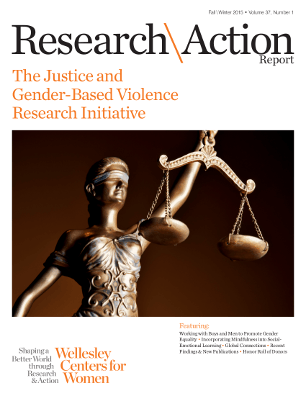Research & Action Report, Fall/Winter 2015
Sari Pekkala Kerr, Ph.D., senior research scientist/economist at the Wellesley Centers for Women (WCW), spent four weeks visiting the Research Institute of the Finnish Economy (ETLA) in Helsinki where she used grant money from the Yrjo Jahnsson Foundation to continue her research on the project, “Within and Between Firm Trends in Job Polarization: Role of Globalization and Technology.”
Nan Stein, Ed.D., WCW senior research scientist, co-presented “Sexual harassment in schools: A Swedish sexual harassment lawsuit through the eyes of an expert witness” with Katja Gillander Gådin, Ph.D., professor in the Department of Health Sciences at Mid Sweden University, during the Sexual Violence Research Initiative (SVRI) fourth international conference, SVRI Forum 2015: Innovation & Intersections, held in mid-September in Stellenbosch, South Africa. The presentation was part of the “Violence against children and adolescents in schools” panel. The Forum, a key platform for sharing research, innovation and networking, brought together researchers, gender activists, funders, policymakers, service providers, practitioners, and survivors from around the world; showcased innovation to end sexual violence, intimate partner violence, and child abuse; and strengthened responses to survivors in low and middle income countries.
Cape Verde Scholar Visit to Wellesley, MA
The Wellesley Centers for Women (WCW) welcomed Clementina Furtado, Ph.D., director of the Center for Research and Training in Gender and Family (CIGEF) at the University of Cape Verde for a special visit and discussion in September. Furtado shared a brief presentation of the actions taken by CIGEF aimed at promoting gender equality. She described the Center, its appearance, mission, and importance as a center for research on gender and family within the Public University of Cape Verde; talked about the research developed by the Center regarding this issue; provided recommendations on existing projects and trainings carried out in the center; and referred to CIGEF’s works inside and outside Uni-CV, aimed at promoting changes.
First SEED Seminar Facilitated in the U.K.
This year, Rachel van Duyvenbode, Ph.D., a senior university teacher at the University of Sheffield (U.K.), facilitated the U.K.’s first SEED (Seeking Educational Equity and Diversity) seminar focused on inclusive curriculum. Van Duyvenbode had been teaching graduate classes in critical whiteness studies for many years and while developing her research interests in pedagogical and theoretical approaches to understanding privilege systems, she discovered the work of the National SEED Project.
What started as a tentative conversation with her Head of School about how working with the National SEED Project might address local concerns related to recruiting and supporting a diverse student population in the School of English, developed quickly into a broader proposal to integrate the SEED Project into key areas of the University’s strategic framework. Supported by a small team of enthusiasts, including Ida Kemp, Gill Tait, Julie Campbell and Alex Mason, van Duyvenbode led the process of bringing SEED to the U.K.
Van Duyvenbode attended the SEED New Leaders Training Week in 2014 and experienced the transformative impact of the structured methodology and immersive, storytelling environment. She returned to the U.K. excited by the prospect of using the scaffold of SEED pedagogy to build an effective and relevant program for U.K. participants. Leading the program in a research-intensive university, van Duyvenbode and Mason, the graduate SEED assistant, built and resourced a private area of the website to host peer-reviewed papers, videos, and reflective exercises. Resolved to find a method rooted in the principles of the SEED methodology, while recognizing how unfamiliar this approach is to the practice and culture of U.K. universities, van Duyvenbode undertook further training in group facilitation methods in order to develop a range of tools to nurture deep learning without always explicitly undertaking serial testimony. In addition, by drawing on the skills and experiences of colleagues, guest facilitators, and student speakers, the sessions aimed to deploy an inclusive approach by balancing the pedagogical potential of theater, art, and video with structured conversations and cognitive dissonance arising out of personal and imaginative reflections on scholarship.
With the help of a focus group, van Duyvenbode selected seven key topics for the seminars including: towards an intersectional model of diversity; gender equity; institutional racism; privilege and power; meritocracy and elitism; knowledge production in the academy; inclusive curriculum; and envisioning change. The seminars ran monthly from January to July 2015 with 23 participants representing all faculties and a range of job grades and responsibilities. In an effort to foster a grass-roots approach to institutional change, participants were invited at each session to conceive of ways to use their own influence and power to work for positive change. In recognition of this pioneering work developing the Sheffield SEED project, van Duyvenbode was invited to address the University of Oxford’s inaugural meeting about diversifying the curriculum and has been commissioned to write a paper for the Higher Education Academy joint publication with the Equality Commission Unit (forthcoming 2016). Van Duyvenbode will facilitate the second Sheffield SEED Project on Inclusive Curriculum in Spring semester 2016.


